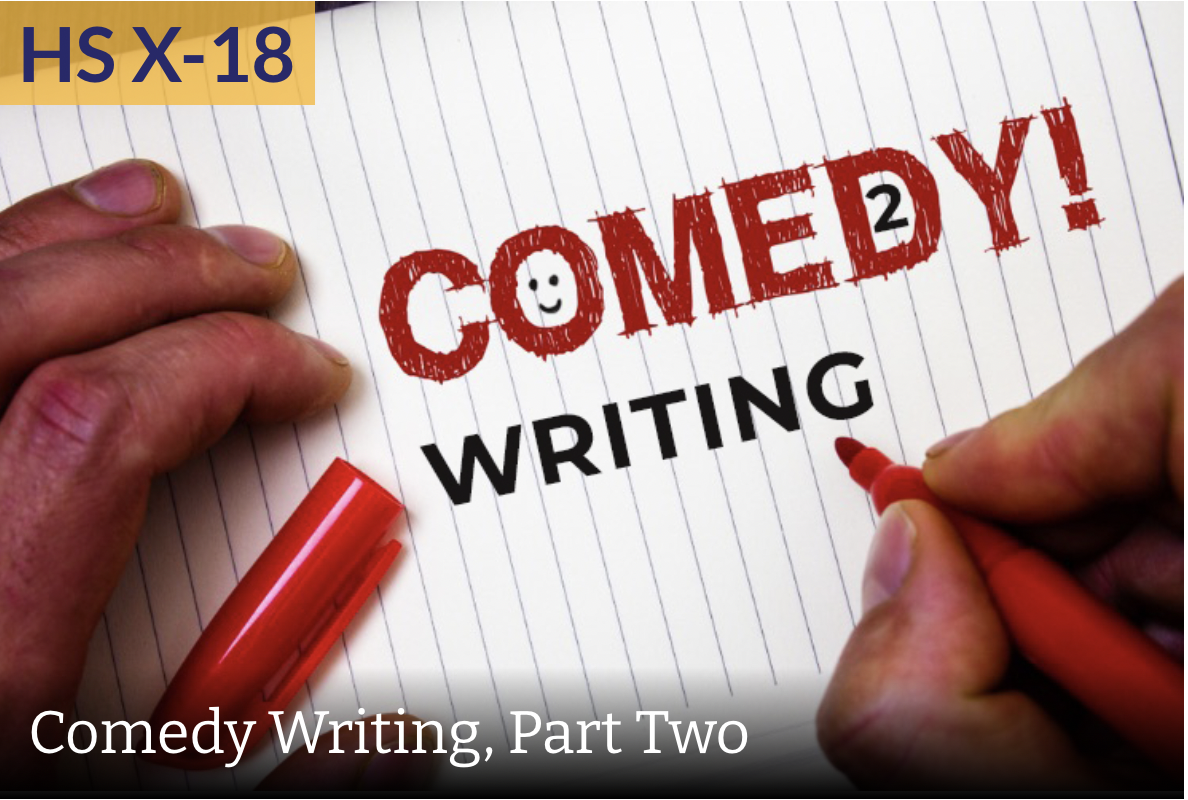
Using the styles of comedy in literature and spoken form, practice and
hone your comedy writing skills with hands-on writing projects -- to become a better writer.
How to get the most out of Comedy Writing: Comedy and Humor in Literature and Life, Part Two (HS X-18) with Kevin O’Brien:
- Watch each Recorded class session.
- Complete all quizzes and assignments. Parents can grade any essay questions.
- The reading for each week can be found in that week's module.
- Repeat for each until course is completed.
- Once the course is completed to the parent's satisfaction, there is a Certificate of Completion at the end to be filled in for your records. Homeschool Connections does not provide record keeping.
Total Classes: 8
Duration: 55 minutes
Prerequisite: Comedy Writing: Comedy and Humor in Literature and Life, Part One (HS X-17)
Suggested Grade Level: 9th to 12th grade
Suggested Credit: One semester Comedy Writing, Creative Writing, or English
Instructor: Kevin O’Brien
Instructor Email: kevin@classeswithkevin.
Course Description: Become a great writer as you expand beyond the traditional writing course. Get hands-on writing practice using comedy as a springboard for perfecting your writing skills. In an interesting yet challenging way, this course takes the forms, methods, and genres of comedy learned in Part 1 to help you become a better writer. Continue to explore comedy in literature, short forms, sketches, stand up, satire, and more in this enjoyable and practical course for all writing students. Learn how comedy and humor can enrich all academic and creative writing. If you want to extend your writing skills in an enjoyable, practical course (with English, literature, and writing credit), then this is the course for you!
Course Outline:
-
Week 1: In the steps of Literary Humorists: Analyzing and practicing in the form and style of literary giants (Mark Twain, Dave Barry, and more); learning how the writer uses his/her particular talents and skillset to make people laugh; choosing one famous person and writing a humorous story for silent reading in his/her style (quiz, reading/examples, assignment rough draft is turned in).
-
Week 2: Feedback on Assignment 1 Rough Drafts; analyzing the characteristics, styles, and tips for improving your own writing
-
Week 3: Final Draft of Assignment 1 Due; presenting our writing/humorous work in-class
-
Week 4: In the steps of the Writers of Spoken Comedy (sketches and standup): analyzing and practicing in the form and style; learning how to write for an audience who will be listening/for a “live” performance (quiz, reading/examples, assignment is a rough draft).
-
Week 5: Feedback on Assignment 2 Rough Drafts; analyzing the characteristics, styles, and tips for improving your own writing
-
Week 6: Final Draft of Assignment 2 Due; presenting our writing/humorous work in-class
-
Week 7: Writing for Public Speaking and Personal Communications: We will write a speech that could be delivered in a “live” setting (awards, after-dinner speeches, commencement addresses, business presentations, business pitches, and more); learning how to verbally present what’s written with pacing, body language, pitch/tone/inflection, and more.
-
Week 8: Editing and Finalizing your Work; final presentations!
Course Materials: PDF’s and links to material are provided free by the instructor.
All documents are turned in as Microsoft Word documents. If you do not own Microsoft Word 2007 or a later version, you can use a system such as Google Docs that converts to Word documents free.
Homework: Students will complete three (3) writing projects. There is an estimated two to three hours of homework/coursework per week outside of attending the live class.
- Teacher: E B Conroy
- Teacher: Bonnie Donlon
- Teacher: Aubrey Heki
- Teacher: Kevin OBrien
- Teacher: Sharon Weis